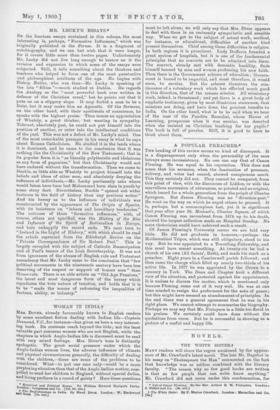MR. LECKY'S ESSAYS.* OP the fourteen essays contained in this
volume, the most interesting is, perhaps, "Formative Influences," which was originally published in the Forum. It is a fragment of autobiography, and we can but wish that it were longer, for it covers little more than twelve pages. Unfortunately Mr. Leary did not live long enough to bestow on it the revision and expansion to which some of the essays were subjected. Still, it tells something about the thinkers and teachers who helped to form one of the most penetrative and philosophical intellects of the age. He begins with Bishop Butler, who was then—Mr. Lecky is speaking of the late "fifties "—much studied at Dublin. He regards the Analogy as the "most powerful book over written in defence of the Christian creed," but he points out that it puts us on a slippery slope. It may forbid a man to be a Deist, but it may make him an Agnostic. Of the Sermons, on the other hand, with their apotheosis of conscience, he speaks with the highest praise. Then comes an appreciation of Whately, a great thinker, but wanting in sympathy. Tolerant, absolutely just, he could not put himself into the position of another, or enter into the intellectual conditions of the past. This was not a defect of Mr. Lecky's mind. One of the most remarkable passages in his essay is what he says about Roman Catholicism. He studied it in the lands where it is dominant, and he came to the conclusion that it was nothing like the Christianity of the New Testament; that in its popular form it is "as literally polytheistic and idolatrous as any form of paganism," but that Christianity would not have endured without the transformation. Then we come to Buckle, as little able as Whately to project himself into the beliefs and ideas of other men, and absolutely denying the influence of individuals,—Mr. Lecky pertinently asks where would Islam have been bad Mohammed been slain in youth by some stray dart. Nevertheless, Buckle "opened out wider horizons in the field of history than any previous writer." And his heresy as to the influence of individuals was counteracted by the appearance of The Origin of Species, with its insistence on "inborn and hereditary tendencies." The outcome of these "formative influences," with, of course, others not specified, was the History of the Rise and Influence of the Spirit of Rationalism in, Europe, and here unhappily the record ends. We next turn to "Ireland in the Light of History," with which should be read the article reprinted from the Edinburgh Review on the "Private Correspondence of Sir Robert Peel." This is largely occupied with the subject of Catholic Emancipation and of Peers tenure of the Irish Secretaryship. It was not from ignorance of the abuses of English rule and Protestant ascendency that Mr. Lecky came to the conclusion that "few political movements in the nineteenth century have been less deserving of the respect or support of honest men" than Home-rule. There is an able article on "Old-Age Pensions," the latest and most dangerous form of the heresy which repudiates the true nature of taxation, and holds that it is to be "made the means of redressing the inequalities of fortune, ability, or industry."










































 Previous page
Previous page